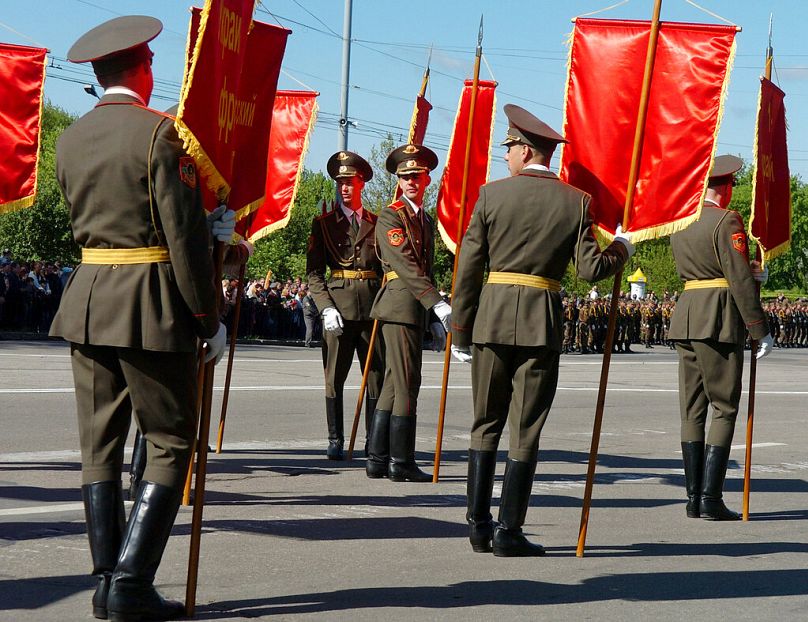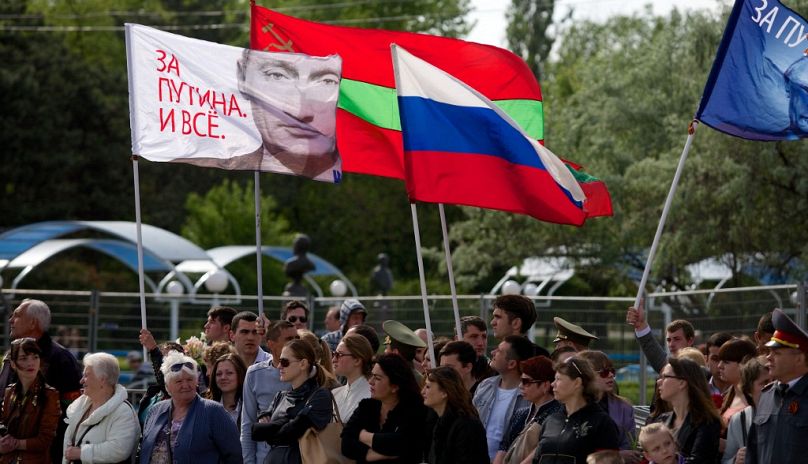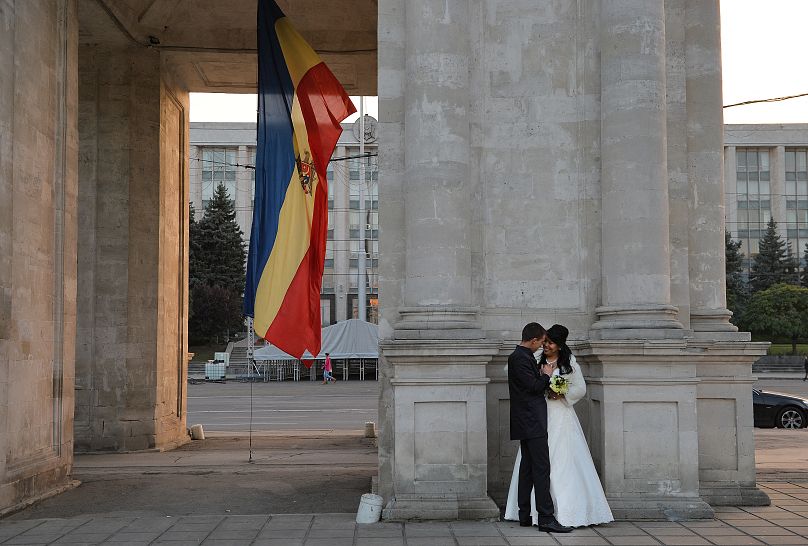Russia has blackmailed the eastern European country of 2.6 million for over three decades. Now, Chișinău's pro-European turn should be greeted with enthusiasm, security expert Claudiu Degeratu argues.
A miracle is about to happen in Moldova. The former Soviet republic, today a candidate country for European Union membership, is about to fully break from Moscow's grasp and redefine its strategic identity in challenging times.
Despite the Kremlin's not-so-veiled threats of expanding its aggression against Ukraine to the eastern European country of 2.6 million people, Chișinău has remained unmoved, surprising many.
Yet, after all, Moldovans have been acutely aware of Moscow's malignant behaviour ever since the 1992 war in Transnistria brought on a new invention in terms of Russia's control in the post-Soviet space.
A frozen conflict in a grey, militarily controlled breakaway area within the territory of a state forcing it to declare itself as neutral allowed Russia to maintain a foothold further westwards in Europe for more than three decades.
Despite that, except for Romania, Poland and the Baltic countries, the rest of the Europeans — if and when they paid attention to Moldova — saw the situation there as stable. Complicated, but stable.
And so, for decades, nothing seemed to impose Moldova on the European agenda, an issue that could be at least partially explained by the stereotypical attitude towards the former republics of the Soviet Union.
Then the full-scale invasion of Ukraine in 2022 changed everything.
Moldova's neutrality: Moscow's gilded cage
Russia's war in Ukraine is, in many ways, also about the Republic of Moldova. In 2014, Moscow's designs were not so evident because Russian military aggression in the Donbas and Crimea had the element of surprise. Kyiv's forces were quickly defeated, and the active military phase ended promptly.
Just like in Chișinău, the political elites in Kyiv did not prepare for war at the time and had no plans to defend against Russia, forcing Ukraine to a stalemate, an echo of Moldova's political and military neutrality.
The illegally annexed territories were quickly militarised, following the same blueprint. For decades, thousands of Russian soldiers in Transnistria — officially on a "peacekeeping" mission — were there to remind everyone what would happen if the country's leaders were to change their minds or earlier agreements or fight back.
Last year's all-out war of aggression, however, made Russia a pariah and emboldened the likes of Moldova enough to distance itself away from Moscow.
This led to Russian Foreign Minister Sergey Lavrov menacing Chișinău in recent days and labelling it as the West's new "anti-Russian project".
The eternal head of Russian diplomacy was probably spurred on by the prospect that Moscow would permanently lose its ability to blackmail it on matters such as domestic and foreign policy, energy, and economic assistance.
For years, Moscow behaved like a demanding, brash teacher on the topics of neutrality for countries like Ukraine, Moldova, and Georgia, and Lavrov felt good in his dual role as a referee and power-broker for pro-Russian groups in these countries.
In Moldova, the issue of neutrality and disarmament became taboo. Otherwise, Moldovan politicians risked being labelled as enemies of Moldova's statehood, pro-unionists looking for Romania to swallow up its eastern neighbour, or simply pro-NATO supporters.
Sense of safety from control and a carbon copy of Kremlin's corruption
But how was the assumed position of neutrality justified, considering the presence of Russian troops on the sovereign territory of Moldova?
Although there is no clear answer, I am inclined to believe that for some 30 years, Moscow managed to achieve adequate control over a significant part of the domestic elites in Chișinău.
The pro-Moscow parties in Moldova received the Kremlin's support in exchange for asserting a pro-Russian and anti-European identity. Economic dependence mattered just as much.
Moreover, full control of the defence, security and intelligence services offered a sense of safety to any pro-Russian party chief in the Republic of Moldova.
Corruption which has plagued the country since its independence, came as a mimicry, a carbon copy of the practices in the Russian Federation.
With all that stacked against the government in Chișinău, even the slightest change in course would inevitably result in trouble.
It was enough for a president like Maia Sandu to challenge Moscow's Russophile and anti-Europeanist narrative with a speech about the country's pro-EU desires, anticorruption initiatives and overall reform to rattle Moscow to the point it became nervous and threatening.
Moreover, discussions over Moldova's continued neutrality policy became particularly worrisome for Moscow when the pro-European political parties squarely sided with Ukraine.
In turn, it used Moldova's energy dependence on Russia to create internal conflict.
The street demonstrations of the pro-Russian parties in Chisinau were, in essence, destabilisation attempts.
Most Europeans were not aware of these "bitter fruits" of Moldovan neutrality and would remain in the dark if Russia had not invaded Ukraine.
Even those who had known about these issues for years were not clear on the scale until the fluid strategic context created by the Russian aggression in Ukraine came to the fore.
Now, it is time to do more to help the country find its way out of its quagmires. The international support platform for Moldova, run by France, Germany, and Romania, is a perfect start.
European integration and strategic autonomy are the solutions to Russia's pressure
The war in Ukraine will fundamentally change the paradigm of defence in Europe, and the Republic of Moldova has a choice.
Moreover, after a year of war in the neighbouring state, Chișinău's balance sheet of honest politicians vs those influenced or outright controlled by Moscow is not to the liking of the Russian Federation.
Moreover, the courageous decisions taken by President Sandu and the pro-European government led by Natalia Gavrilița have shifted this balance even further.
That has led your average Moldovans to begin to see the gilded lattices of the cage of supposed neutrality designed to suit Moscow and supported by Lavrov and others at the Kremlin.
The examples of Sweden and Finland, authentic neutral states resilient to any significant evolution in the security environment despite Russia's proximity, gave Moldova an essential lesson on how to respond to Moscow's blackmail, especially when it's done openly.
Moscow's paternalistic neutrality trumpeted against Moldova cashes in on the fear of war, the fear of the costs of energy dependence, and internal instability.
Moldova is about to discover that, while neutrality can remain a constitutional principle in the face of these dramatic changes, salvation can only come in the form of European integration and genuine strategic autonomy.
Furthermore, the defence strategy of the Republic of Moldova and its armed forces have become the most critical priorities. Moldova needs modern defence capabilities, assistance programs and defence resources.
If this were to fail, neutrality without ensuring strategic autonomy would continue to be just another sophisticated way for the country to remain in the Russian imperial periphery.
The Moldovan miracle could be one of the European success stories.
Now is the time for Europe to believe in it.
Claudiu Degeratu holds a PhD in International Relations and European Studies and is Associate Expert at GlobalFocus Center in Bucharest. In the past, he has worked as General Director for Defence Policy and Planning at the Romanian Ministry of Defence.
At Euronews, we believe all views matter. Contact us at view@euronews.com to send pitches or submissions and be part of the conversation.














